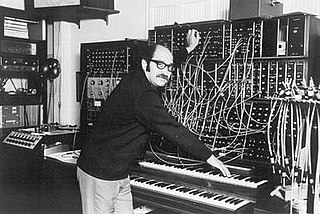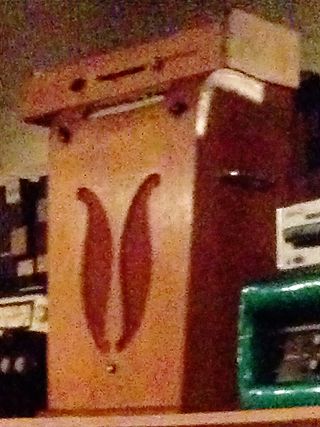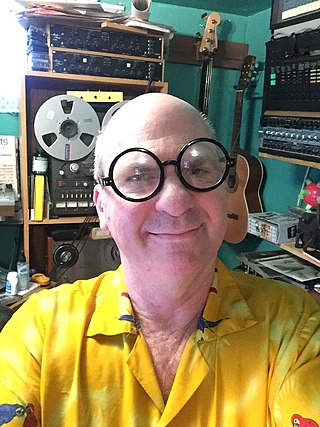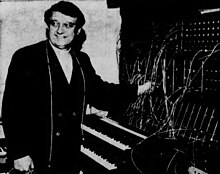Electronic music broadly is a group of music genres that employ electronic musical instruments, circuitry-based music technology and software, or general-purpose electronics in its creation. It includes both music made using electronic and electromechanical means. Pure electronic instruments depended entirely on circuitry-based sound generation, for instance using devices such as an electronic oscillator, theremin, or synthesizer. Electromechanical instruments can have mechanical parts such as strings, hammers, and electric elements including magnetic pickups, power amplifiers and loudspeakers. Such electromechanical devices include the telharmonium, Hammond organ, electric piano and electric guitar.
Synth-pop is a music genre that first became prominent in the late 1970s and features the synthesizer as the dominant musical instrument. It was prefigured in the 1960s and early 1970s by the use of synthesizers in progressive rock, electronic, art rock, disco, and particularly the Krautrock of bands like Kraftwerk. It arose as a distinct genre in Japan and the United Kingdom in the post-punk era as part of the new wave movement of the late 1970s.

Switched-On Bach is the debut album by the American composer Wendy Carlos, released in October 1968 by Columbia Records. Produced by Carlos and Rachel Elkind, the album is a collection of pieces by Johann Sebastian Bach performed by Carlos and Benjamin Folkman on a Moog synthesizer. It played a key role in bringing synthesizers to popular music, which had until then been mostly used in experimental music.

"Popcorn" is an instrumental song composed by Gershon Kingsley in 1969 for the album Music to Moog By. It was performed on the Moog synthesizer and released on the Audio Fidelity label. The name is a combination of pop for Pop music and corn for kitsch. The song became a worldwide hit in 1972, when it was covered by Hot Butter, an American pop band. Since then, multiple versions of the piece have been produced and released, including those by Vyacheslav Mescherin, Anarchic System, Popcorn Makers, the Boomtang Boys, M & H Band, Crazy Frog, and the Muppets.
Perrey and Kingsley was an electronic music duo made up of French composer Jean-Jacques Perrey and German-American composer Gershon Kingsley. The duo lasted from 1965 to 1967 and both are considered pioneers of electronic music. They released under Vanguard Records two studio albums The In Sound From Way Out! and Kaleidoscopic Vibrations. They also were among the first artists to incorporate the Moog synthesizer, prior to the successful 1968 release, Switched-On Bach by Wendy Carlos.

Morton Sanford Garson was a Canadian composer, arranger, songwriter, and pioneer of electronic music. He is best known for his albums in the 1960s and 1970s, such as Mother Earth's Plantasia (1976). He also co-wrote several hit songs, including "Our Day Will Come", a hit for Ruby & the Romantics. According to Allmusic, Mort Garson boasts one of the most unique and outright bizarre resumés in popular music, spanning from easy listening to occult-influenced space-age electronic pop.
Paul Henry Beaver Jr. was an American musician who was a pioneer in popular electronic music, using the Moog synthesizer. From 1967, Beaver collaborated with Bernie Krause as the recording duo Beaver & Krause.
Hot Butter were an American instrumental band fronted by the keyboard player and studio musician Stan Free. The other band members were John Abbott, Bill Jerome, Steve Jerome, Danny Jordan and Dave Mullaney. They were best known for their 1972 version of the Moog synthesizer instrumental song "Popcorn", originally recorded by its composer, Gershon Kingsley, in 1969. The track became an international hit, selling a million copies in France, 250,000 in the United Kingdom, and over two million worldwide.

The Moog synthesizer is a modular synthesizer invented by the American engineer Robert Moog in 1964. Moog's company, R. A. Moog Co., produced numerous models from 1965 to 1981, and again from 2014. It was the first commercial synthesizer and established the analog synthesizer concept.
Roger Joseph Manning Jr. is an American keyboardist, singer, and songwriter who co-founded the bands Jellyfish, the Moog Cookbook, and Imperial Drag. He has also spent several years as a member of Beck's backing band, contributed to several recordings by the band Air, and toured or recorded with acts such as Jay-Z, Blink 182, and Johnny Cash. In 2005, he released his first solo record, Solid State Warrior, followed with Robo-Sapiens, Catnip Dynamite (2008), and Glamping (2018). He is usually credited by his full name to avoid confusion with the folk musician Roger Manning.

Moog is a 2004 American documentary film by Hans Fjellestad about electronic instrument pioneer Robert Moog. The film features scenes of Moog interacting with various musicians who view him as an influential figure in the history of electronic music.

The Ondioline is an electronic analog synthesizer, developed and built by Frenchman Georges Jenny. Sometimes referred to as the "Jenny Ondioline," the instrument is considered a forerunner of the synthesizer. First conceived by Jenny in 1939, he continued refining and reconfiguring the device, producing dozens of variant models up until his death in 1975.
"Baroque Hoedown" is an instrumental by the duet Perrey and Kingsley. Original from 1967 album Kaleidoscopic Vibrations a follow-up to their previous 1966 album, The In Sound From Way Out!. The two albums were reissued in 1988 on one compilation album entitled The Essential Perrey and Kingsley.

Jean Marcel Leroy, better known as Jean-Jacques Perrey, was a French electronic music performer, composer, producer, and promoter. He is considered a pioneer of pop electronica. Perrey partnered with composer-performer Gershon Kingsley to form the electronic music duo Perrey and Kingsley, who issued some of the first commercial recordings featuring the Moog synthesizer. Perrey was also one of the first to promote, perform, and record with the Ondioline, developed by Georges Jenny.

The use of electronic music technology in rock music coincided with the practical availability of electronic musical instruments and the genre's emergence as a distinct style. Rock music has been highly dependent on technological developments, particularly the invention and refinement of the synthesizer, the development of the MIDI digital format and computer technology.
Ken Bichel is an American actor, composer, conductor, pianist, and synthesizer musician.

Moog Indigo is the ninth studio album by the French electronic music pioneer Jean-Jacques Perrey, released in 1970 on the Vanguard Records label. The album's name is a reference to the jazz song "Mood Indigo" by Duke Ellington.

Transient Random-Noise Bursts with Announcements is the second studio album by English-French rock band Stereolab, released on 10 August 1993 and was issued by Duophonic Records and Elektra Records. It was recorded with an expanded line-up, and is generally considered to be the band's noisiest release due to its emphasis on distorted guitars and keyboard sounds.

Dana Countryman is an American electronic music composer, songwriter and performer notable for his sustained presence in the Seattle Pop scene as well as his collaborations with French electropop artist Jean-Jacques Perrey. He is also well known as songwriter and performer for The Amazing Pink Things (1985–1991). as well as the publisher for Cool and Strange Music Magazine (1996–2003). Countryman is currently composing, performing and releasing original albums of retro vocal pop. Reviewer John Borack has described Countryman as "a one-man Brill Building," in reference to the New York-based songwriting and recording scene of the 1960s.











